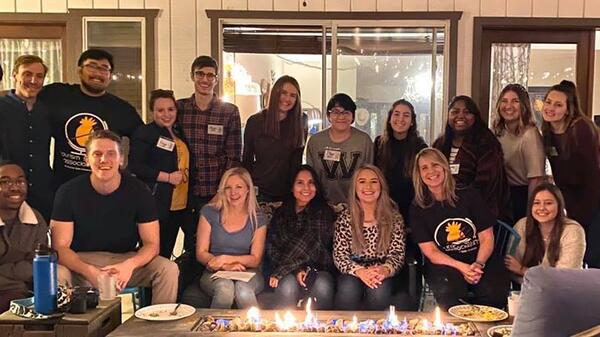Tourism students prepare for future of travel and leisure industries in wake of COVID-19 pandemic
April 23, 2020 - Despite their staying home along with millions of other Americans, ASU students continue to learn about the value of tourism and where they hope to be working in the industry following the COVID-19 pandemic.
The more than 50 student and alumni members of ASU’s Tourism Student Association (TSA) are counting on the hope that eventually, as decisions are carefully made to allow public interaction to begin again, the previously homebound will express their desire to enjoy, experience and learn from travel.
TSA was founded in 2018 at the School of Community Resources and Development within the Watts College of Public Service and Community Solutions. Its charge is to help students explore tourism through traveling and learning from those who manage tourism and those affected by it.
Students attending the group’s April 14 meeting expressed concerns about the immediate challenges they are facing as a result of COVID-19.
They said they are challenged by fighting the melancholy of missing their on-campus life, trying to focus on their studies without the routines they rely on, counting down the days of isolation to ensure their families are not infected, furloughs from jobs in the hospitality industry and looking for side gigs to make ends meet.
More pressing on their minds included how the impact of COVID-19 and its decimating influence on the tourism industry will affect their career prospects after graduation.
Manage risk, resilience, diversity, students told
Rebekka Goodman, tourism development and management lecturer, told the group during their meeting that while the tourism industry is uncertain today, students wishing to enter it must position themselves uniquely.
In addition, while many people are looking forward to a healthy economy, sustainability in tourism remains as important as ever, she said.
“With economic bounce-back on everyone’s mind, the term ‘sustainability’ as it is often interpreted may not be as appealing or top-of-mind as it once was,” Goodman said. “But since we know that managing risk, resilience and diversity have always been a part of sustainability, you will find work with the skills you have to ensure that our industry weathers future storms like this one and comes out stronger.”
TSA adviser Claire McWilliams, tourism development and management instructor, told members that this time period is a traumatic event — a moment that divides life into before and after.
“We normally face these distressing events in life individually and often without others even knowing it. This is unique — we are all experiencing a traumatic period simultaneously, and we are not sure yet what the other side even looks like,” McWilliams said. “Being supportive of one another, even when we don’t have all the answers, is really important.”
Tailor job search to match opportunities in slow-returning industry
The group’s monthly “Talk Tourism” guest, Troy Bennett, co-founder and lead advisor for eXceed Hospitality Asset Advisors, discussed the implications of the COVID-19 crisis and the travel and tourism industry and lodging sector.
Bennett told students that the industry will return, it always does, but that there is a tough road ahead for it and many other industries. He predicted that recovery will be slow, and that the pace of it will be different in varying sectors of the industry.
Bennett discussed the cycle that will soon emerge including how highly leveraged hotel properties that cannot stay afloat will be lost and then purchased by investors ready to pounce on newly affordable inventory. Bennett said he believed that the demand side — travelers — will take time to regain the courage to travel, and as a result, non-air travel will re-emerge regionally and domestically long before international travel will ramp up.
Competition with furloughed workers, many of whom are highly experienced professionals, will make new entrants into the industry less competitive, Bennett said.
He recommended students look for the areas of the industry that are non-traditional or hybrids, where the impact has not hit proportionately as hard as hotel properties. These include golf, clubs and residential active communities.
Bennett said the “stone-cold reality” is that students may need to enter wherever they can get a foothold and prove their ability to adapt, perform and innovate even in restrictive conditions.
New officers, two activities
Members at the virtual meeting also elected a slate of 2020-2021 officers and planned two activities for the last weeks of the spring semester: The Phoenix Area Revenue Managers will hold a webinar on Arizona lodging conditions, and a SAFE (Safeguarding All From Exploitation) Summit originally planned to take place on campus in coordination with the Attorney General’s Office has been moved online.
Members will still have the chance to become SAFE-certified and learn about how to prevent and respond to trafficking that occurs in the tourism industry.
Newly elected TSA President Paige Corbin said her organization, like all others at ASU, is awaiting the unknown.
“Regardless of the format in which we return to classes in the fall, the TSA plans to remain a club that enhances its member’s college experiences,” Corbin said. We know that the industry a majority of our members plan to enter following graduation is in a time of great change, but we still plan to continue supporting our members and offering the best professional development opportunities that we can.”
To learn more about the Tourism Student Association, contact Paige Corbin at [email protected]. Visit TSA’s Facebook page: https://www.facebook.com/groups/tourismstudentassociation/.
Source: School of Community Resources and Development, Watts College of Public Service and Community Solutions
